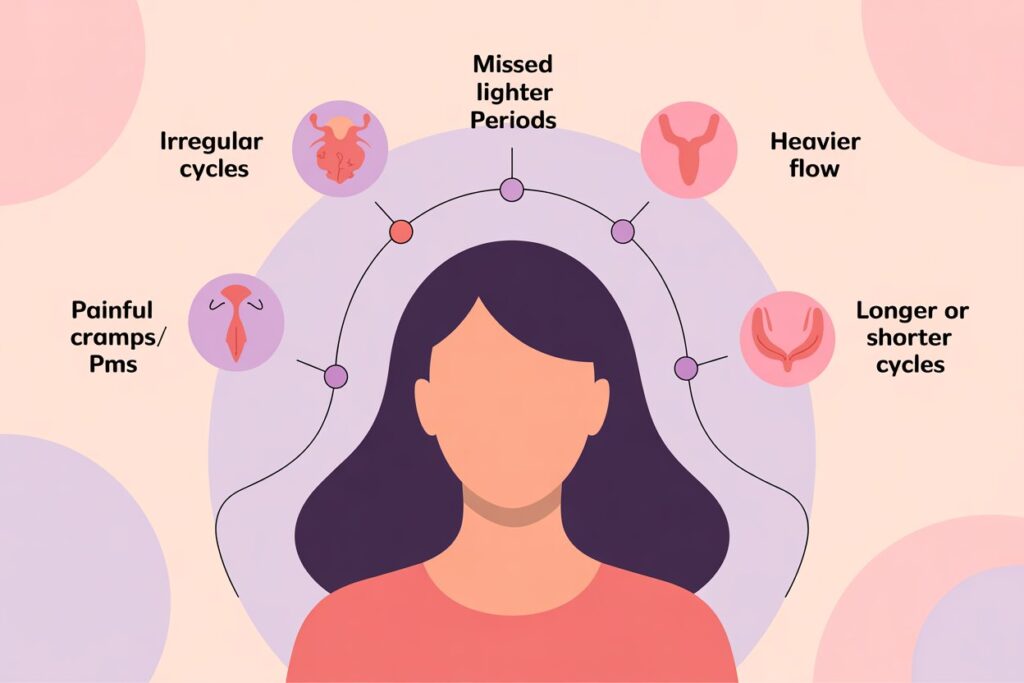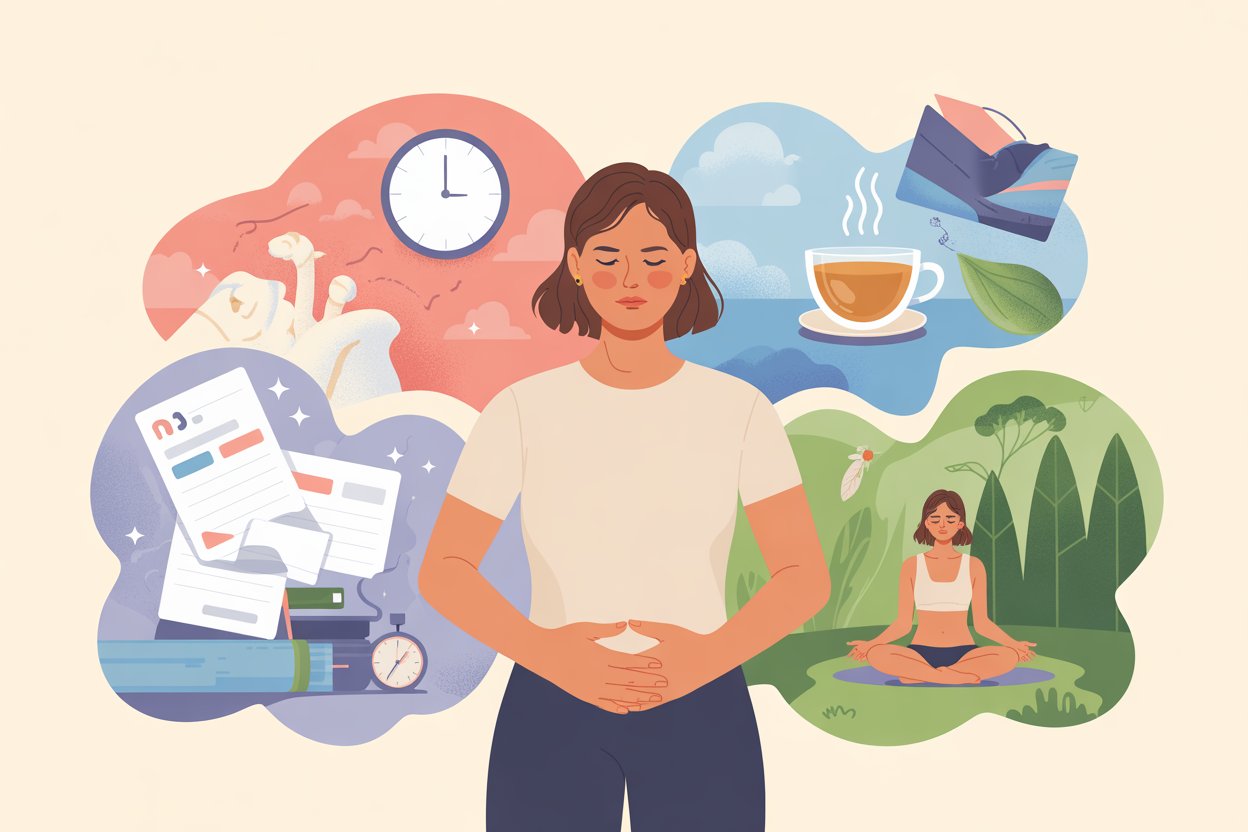Most women have experienced times when their periods felt “off.” Maybe your cycle came later than expected, the flow was unusually heavy or light, or PMS symptoms were stronger than usual. Often, these changes leave us puzzled. One of the most common but less talked-about reasons is stress. To really understand how stress affects periods, it’s important to know how deeply the mind and body are connected. Stress doesn’t just stay in your head—it influences your hormones, sleep, digestion, and even your reproductive system.
The Science Behind How Stress Affects Periods
The menstrual cycle is controlled by a delicate balance of hormones, mainly estrogen and progesterone, which are regulated by the brain through the hypothalamus and pituitary gland. When you are under stress, your body releases a hormone called cortisol. Cortisol is helpful in short bursts—it prepares you to respond to challenges. But when stress becomes chronic, high levels of cortisol start interfering with the normal communication between the brain and reproductive organs.
This can disrupt ovulation, delay your period, or sometimes even cause you to skip it altogether. Some women may also notice heavier bleeding or worsening cramps, while others may see lighter and shorter cycles. Essentially, how stress affects periods depends on how your body reacts to elevated cortisol and the imbalance it creates in reproductive hormones.
Common Ways Stress Shows Up in Menstrual Health
When stress begins to impact your cycle, it doesn’t look the same for everyone. Some of the most common menstrual changes linked to stress include:
- Irregular cycles – Your period may come earlier, later, or unpredictably.
- Missed periods – High stress can sometimes stop ovulation temporarily, leading to skipped cycles.
- Heavier or lighter flow – Some women bleed more than usual, while others barely bleed at all.
- Painful cramps or PMS – Stress can heighten inflammation and make cramps, bloating, or mood swings worse.
- Longer or shorter cycles – The average menstrual cycle is 28–30 days, but stress may stretch it out or shorten it significantly.

Recognizing these changes is the first step toward managing them naturally.
Why the Body Reacts This Way
To put it simply, your body does not know the difference between emotional stress (like work deadlines or family worries) and physical danger. From an evolutionary point of view, when you’re stressed, your body thinks it needs to survive a threat. In survival mode, reproduction is not the priority. That’s why the body often diverts energy away from the reproductive system, leading to irregular periods or hormonal imbalances. Understanding how stress affects periods in this way helps explain why relaxation techniques and lifestyle changes can actually restore balance.
Natural Ways to Manage Stress for Better Menstrual Health
The positive side is that while stress may disturb your cycle, the body also has an incredible ability to heal and rebalance once stress is managed. Here are natural, practical solutions:
1. Prioritize Relaxation and Mindfulness
Practices like yoga, meditation, and deep breathing exercises reduce cortisol levels. Just 10–15 minutes of mindful breathing daily can calm the nervous system and promote hormonal balance. Many women find guided meditation apps or simple gratitude journaling before bed especially effective.
2. Maintain a Consistent Sleep Routine
Sleep is when your body resets and hormones stabilize. Poor or irregular sleep patterns can worsen stress and period irregularities. Aim for 7–8 hours of quality sleep every night, going to bed and waking up at the same time. Keeping your bedroom cool, dark, and free of screens can improve sleep quality.
3. Nourish Your Body with the Right Foods
Your diet plays a big role in both stress and periods. Whole grains, fresh vegetables, fruits, nuts, and seeds provide the nutrients your body needs to regulate hormones. Leafy greens like spinach and kale help replenish iron lost during menstruation. Omega-3 rich foods like flaxseeds, walnuts, and salmon can reduce inflammation and ease cramps. Avoid excessive caffeine and processed sugar, which can spike anxiety and worsen PMS symptoms.
4. Gentle Exercise and Movement
Exercise is a natural stress reliever because it increases endorphins—the body’s “feel-good” hormones. However, too much intense exercise can sometimes have the opposite effect and delay periods. Choose moderate activities like brisk walking, swimming, or yoga that energize you without overloading the body.
5. Herbal Support and Teas
Certain herbs have been traditionally used to support women’s health during stressful times. Chamomile tea is soothing and aids relaxation. Ashwagandha, a well-known adaptogen in Ayurveda, helps the body cope with stress and balance hormones. Always check with a healthcare professional before adding supplements, especially if you’re on medication or trying to conceive.
6. Hydration and Warm Therapy
Something as simple as drinking enough water can help reduce bloating and fatigue during PMS. Warm compresses, hot water bottles, or a relaxing bath can ease cramps and promote relaxation, helping the body let go of stress more easily.
7. Limit Digital Overload
Endless scrolling or late-night screen time keeps the brain in a constant state of stimulation, raising stress levels. Taking regular digital detox breaks—especially before bed—can lower anxiety, improve sleep, and indirectly help regulate your menstrual cycle.
When to Seek Medical Advice
While occasional irregularities caused by stress are common, persistent changes should not be ignored. If your periods have stopped for three months or more, if you experience severe pain, or if stress management doesn’t bring improvement, consult a gynecologist. Sometimes other conditions such as PCOS, thyroid issues, or anemia may overlap with stress-related problems, and a doctor can guide you to the right treatment.
Final Thoughts
Understanding how stress affects periods gives you the power to take control of your menstrual health. Stress is an unavoidable part of modern life, but how we manage it makes all the difference. By nurturing your body through mindfulness, sleep, nutrition, gentle exercise, and simple self-care practices, you can restore balance and support a healthier cycle. Periods are not just a monthly event—they are a reflection of your overall well-being. Listen to your body, manage your stress, and your cycle will often follow in harmony.
For more detailed information on how stress and other factors can cause menstrual changes, you can refer to this guide by the U.S. Office on Women’s Health.







